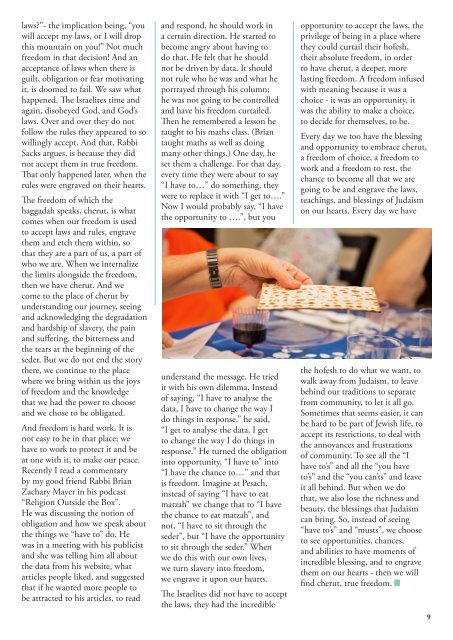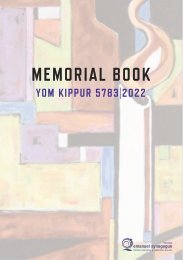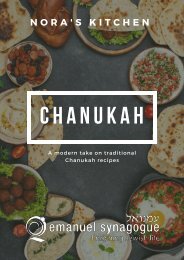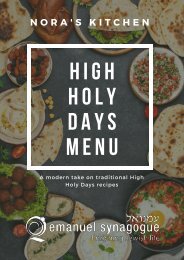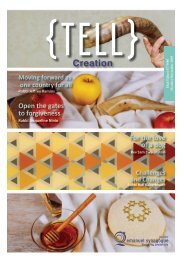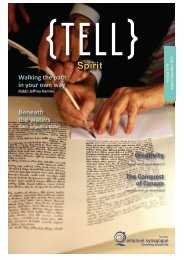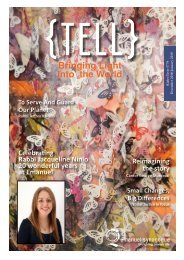You also want an ePaper? Increase the reach of your titles
YUMPU automatically turns print PDFs into web optimized ePapers that Google loves.
laws?”- the implication being, “you<br />
will accept my laws, or I will drop<br />
this mountain on you!” Not much<br />
freedom in that decision! And an<br />
acceptance of laws when there is<br />
guilt, obligation or fear motivating<br />
it, is doomed to fail. We saw what<br />
happened. The Israelites time and<br />
again, disobeyed God, and God’s<br />
laws. Over and over they do not<br />
follow the rules they appeared to so<br />
willingly accept. And that, Rabbi<br />
Sacks argues, is because they did<br />
not accept them in true freedom.<br />
That only happened later, when the<br />
rules were engraved on their hearts.<br />
The freedom of which the<br />
haggadah speaks, cherut, is what<br />
comes when our freedom is used<br />
to accept laws and rules, engrave<br />
them and etch them within, so<br />
that they are a part of us, a part of<br />
who we are. When we internalize<br />
the limits alongside the freedom,<br />
then we have cherut. And we<br />
come to the place of cherut by<br />
understanding our journey, seeing<br />
and acknowledging the degradation<br />
and hardship of slavery, the pain<br />
and suffering, the bitterness and<br />
the tears at the beginning of the<br />
seder. But we do not end the story<br />
there, we continue to the place<br />
where we bring within us the joys<br />
of freedom and the knowledge<br />
that we had the power to choose<br />
and we chose to be obligated.<br />
And freedom is hard work. It is<br />
not easy to be in that place; we<br />
have to work to protect it and be<br />
at one with it, to make our peace.<br />
Recently I read a commentary<br />
by my good friend Rabbi Brian<br />
Zachary <strong>May</strong>er in his podcast<br />
“Religion Outside the Box”.<br />
He was discussing the notion of<br />
obligation and how we speak about<br />
the things we “have to” do. He<br />
was in a meeting with his publicist<br />
and she was telling him all about<br />
the data from his website, what<br />
articles people liked, and suggested<br />
that if he wanted more people to<br />
be attracted to his articles, to read<br />
and respond, he should work in<br />
a certain direction. He started to<br />
become angry about having to<br />
do that. He felt that he should<br />
not be driven by data. It should<br />
not rule who he was and what he<br />
portrayed through his column;<br />
he was not going to be controlled<br />
and have his freedom curtailed.<br />
Then he remembered a lesson he<br />
taught to his maths class. (Brian<br />
taught maths as well as doing<br />
many other things.) One day, he<br />
set them a challenge. For that day,<br />
every time they were about to say<br />
“I have to…” do something, they<br />
were to replace it with “I get to….”<br />
Now I would probably say, “I have<br />
the opportunity to ….”, but you<br />
understand the message. He tried<br />
it with his own dilemma. Instead<br />
of saying, “I have to analyse the<br />
data, I have to change the way I<br />
do things in response,” he said,<br />
“I get to analyse the data, I get<br />
to change the way I do things in<br />
response.” He turned the obligation<br />
into opportunity, “I have to” into<br />
“I have the chance to…” and that<br />
is freedom. Imagine at Pesach,<br />
instead of saying “I have to eat<br />
matzah” we change that to “I have<br />
the chance to eat matzah”, and<br />
not, “I have to sit through the<br />
seder”, but “I have the opportunity<br />
to sit through the seder.” When<br />
we do this with our own lives,<br />
we turn slavery into freedom,<br />
we engrave it upon our hearts.<br />
The Israelites did not have to accept<br />
the laws, they had the incredible<br />
opportunity to accept the laws, the<br />
privilege of being in a place where<br />
they could curtail their hofesh,<br />
their absolute freedom, in order<br />
to have cherut, a deeper, more<br />
lasting freedom. A freedom infused<br />
with meaning because it was a<br />
choice - it was an opportunity, it<br />
was the ability to make a choice,<br />
to decide for themselves, to be.<br />
Every day we too have the blessing<br />
and opportunity to embrace cherut,<br />
a freedom of choice, a freedom to<br />
work and a freedom to rest, the<br />
chance to become all that we are<br />
going to be and engrave the laws,<br />
teachings, and blessings of Judaism<br />
on our hearts. Every day we have<br />
the hofesh to do what we want, to<br />
walk away from Judaism, to leave<br />
behind our traditions to separate<br />
from community, to let it all go.<br />
Sometimes that seems easier, it can<br />
be hard to be part of Jewish life, to<br />
accept its restrictions, to deal with<br />
the annoyances and frustrations<br />
of community. To see all the “I<br />
have to’s” and all the “you have<br />
to’s” and the “you can’ts” and leave<br />
it all behind. But when we do<br />
that, we also lose the richness and<br />
beauty, the blessings that Judaism<br />
can bring. So, instead of seeing<br />
“have to’s” and “musts”, we choose<br />
to see opportunities, chances,<br />
and abilities to have moments of<br />
incredible blessing, and to engrave<br />
them on our hearts - then we will<br />
find cherut, true freedom.<br />
9


